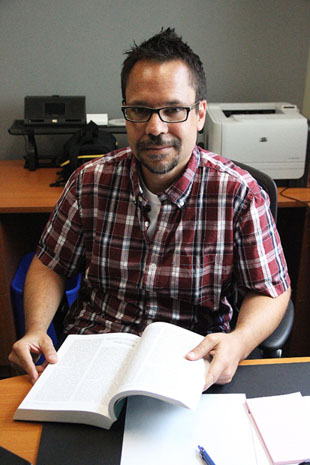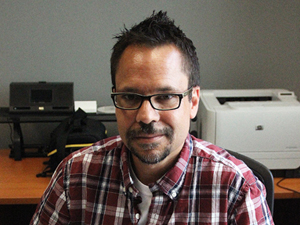
If you have ever wondered about what path your life will take or which direction you should go, you are not alone.
David W. Wakefield, chair of the child and adolescent development department (CADV), was not sure of his calling until graduate school.
Since early schooling, Wakefield noticed his natural curiosity as to why some students excelled in school while others struggled. This curiosity peaked while taking a general education psychology, course as an undergrad, at UC Berkeley. And, so, he pursued a bachelor’s degree in psychology.
When he continued on to graduate school, the puzzle pieces came together.
It was clear that being an educator was his passion.
This epiphany was encouraged by others, principally a crucial support system of family, friends, and professors who pushed Wakefield to achieve higher goals.
Wakefield said these support systems are integral to finding success in education, especially for those in ethnic minority groups who may be the first of their families to attend college.
“Historically there has been limited access to higher education (for ethnic minority groups and first generation college students),” Wakefield said. “That has somewhat changed now (although) the odds are still against you if you don’t have that support system.”
Coming from a family of educators (his parents and grandparents were also teachers), the desire to help others reach their long-term goals and find their path is a family trend.
“We need to do a better job building pathways for people,” he said, “We have a really good group of faculty at Cal State Northridge that are committed to…helping students identify how to navigate college.”
Wakefield takes pride in providing the highest quality education for the 900 students in the child and adolescent development department, although he admits the CSU budget issues have not left the department unscathed.
When it comes to budgetary constraints, trying to be as economical as possible is difficult, he said. Instead of offering more sections with fewer seats, the department opted to offer larger lecture courses with more seats, giving students an opportunity to get into classes they need, according to Wakefield.
“Teaching larger lectures may change some of the ways a professor teaches a class,” Wakefield said. “But faculty at Cal State Northridge are choosing to teach here because they enjoy closely working with students.”
Counseling services is another area where Wakefield’s CADV department has adapted, in particular, by revamping the advisement model.
In an effort to reallocate resources and maximize the benefit for students, mandatory advisement appointments have been replaced with access to online tools and informational workshops on topics like networking and applying to master’s programs.
While faculty has been working hard to maximize student benefits, they have also been bargaining for their own.
This pass Friday the teacher’s union, the California Faculty Association (CFA), and the CSU Chancellor’s office reached a tentative agreement on a new contract for faculty members that extends through June 30, 2014.
Competitive salaries and comprehensive benefits have been a steady concern for faculty members, but the faculty is also aware of the financial circumstances and budget issues the state faces.
“I think most (of the) faculty, including myself, hope that the taxpayers of California pass the initiative to put more money into education,” he said. “Otherwise it seems that things are only going to get worse before they get better.”
Wakefield began teaching at CSUN 13 years ago and describes the experience as fulfilling in many ways. Working closely with students has been the most enjoyable part of his job.
Mentoring students on their research projects in the Presidential Scholars program, which has served as a springboard to the next step for many students, has been a true highlight, he said. In child and adolescent development it is a treat to see students active in the community where they are working with children, families, school districts and community organizations.
Looking back, he recalls the influential people who helped him along the way and the pivotal role their guidance played. Now he is paying it forward.
One lesson he hopes students gain from his classes goes beyond getting an ‘A’.
“Learning ways to self-improve is something I want students to take away,” he said. “(It is) one of the most important things you can learn from the college experience.”
